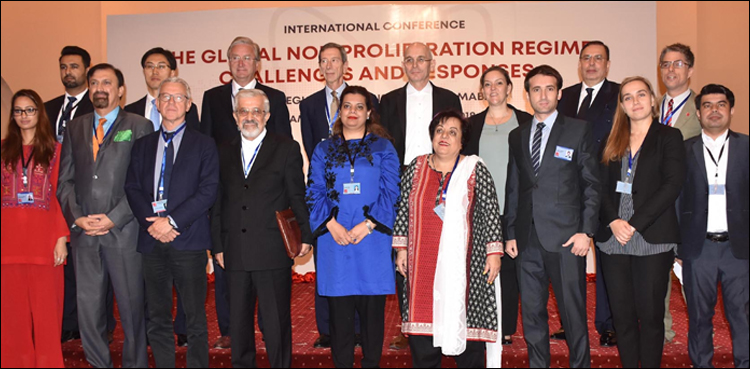ISLAMABAD: Human Rights Minister Shireen Mazari has expressed concern on India’s expanding nuclear arsenal, saying that India has retracted from the no-first use nuclear doctrine and adopted a more aggressive stance on nuclear weapons.
The minister was addressing the concluding session focusing on strategic stability in South Asia on the second day of the international conference on ‘Global Non-Proliferation Regime: Challenges and Response’ organised by the Strategic Studies Institute Islamabad.
The two day conference saw global experts discuss various issues related to non-proliferation. Former Ambassador of Iran to United Nations in Vienna Ali Asghar Soltanieh and Egypt’s Assistant Foreign Minister Sameh Aboul-Enein were among those attending the conference.
On the second day of the international conference, participants discussed the impact of the failure of Joint Comprehensive Plan of Action (JCPOA )signed between Iran and six global powers on regional and global security, global and regional developments and strategic stability in South Asia.
Mazari said the concept of strategic stability needs to be understood with respect to the prevailing security environment in South Asia.
She indicated that there are four major threats to the strategic stability in South Asia including growing conventional asymmetry with India owing to its massive military modernisation, operationalisation of India’s second-strike capabilities, introduction of BMD systems, and purchase of S400 system and changes in Indian nuclear doctrine.
“India have retracted from the no-first use nuclear doctrine and adopted a more aggressive stance on nuclear weapons. India’s expanding nuclear arsenal has been a matter of considerable concern to us,” she added.
Mazari stressed on the need to have strategic dialogue on nuclear related issues with India to achieve
stability in the region. “We have the rationality in our policy in the present circumstances,” she maintained, adding that there needs to have some balance and parity to achieve peace in the region for the betterment and security of the people.Pakistan facing discrimination in nuclear field
She said criteria based approach must be applied on Nuclear Supplier Group (NSG) adding that Pakistan need to have effective diplomacy on NSG issue. “We have one destiny and that is peace. So we have to work together and there is a need to have dialogue on these issues,” she stated
She maintained that Pakistan is facing discrimination in the nuclear field at international level which was also in the NSG. “How Pakistan can join the treaty on prohibition of nuclear weapons in prevailing situation,” she questioned.
Mazari said that several signatories of Non-Proliferation Treaty (NPT) including the United States violated the Article 1 and 2 by signing new deals with India, saying those who need to implement it are violating it.
She said Israel’s nuclear program cannot be left out and they have to it for any progress on non-Proliferation.
She also lamented India’s continued ceasefire violations along the Line of Control (LoC) in Kashmir, and said that Kashmir defines the parameters of Pak-India relations.
Mazari stressed that the Kashmir issue must be resolved in accordance with United Nations Security Council (NSC) resolutions which calls for a UN supervised plebiscite.
She also pointed out that incumbent government would shortly put forth conflict resolution model for Kashmir dispute, and will move beyond rhetoric to find a conflict resolution solution.



Leave a Comment